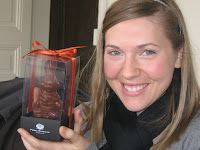It's not an easy thing to admit. When it happens we - those of us who move overseas - try to put on our happy faces and maintain our innocence in the matter. No, we're fine, having a great time, thanks! But the truth is, no matter how much you enjoy your new life abroad, there are moments of doubt, of sadness, of feeling isolated; moments when you want nothing more than to jump on the next flight out of town. It can happen the most seasoned of travelers, and even though we'd rather everyone back home think our fun never ends and our lives are constantly filled with adventure and excitement, sometimes it's not like that at all. Sometimes we get homesick.
That's where I'm at today. Actually, I think this feeling has been building up for a couple of days, but today is the first time I've admitted it to myself, let alone put in out in cyberspace for everyone to see. I've compiled a list of things I miss (not including the obvious: family and friends) in the hopes that putting it out in the open will speed my recovery.
I miss:
1. Having a car
2. Target
3. Happy Hour
4. The Clarendon branch of Washington Sports Club and its 30-odd treadmills
5. Five Guys burgers (Washingtonians, you know what I'm talking about)
6. Caribou Coffee
7. 24-hour anything
8. The Daily Show
9. Chicken wild rice soup
10. The American University library
When you're homesick, it's also important to remember why you came to wherever you are in the first place. It's in this spirit that I present a list of things I
don't miss about home.
I absolutely do not miss:
1. My inhumane work/school schedule
2. A subway system that doesn't go everywhere in the city
3. Paying $8 for a wheel of Brie
4. Paying $7 for a ball of fresh mozzarella
5. Television commercials every five minutes during my favorite shows (hardly any here!)
6. Writing 25-page research papers for each one of my classes
7. Getting carded
8. Crappy wanna-be baguettes
9. Waiting 20 minutes for a metro train on Sundays
10. Nightly news shows that start with homicides
Whew! Better days are surely just around the corner, and even when it feels like they will never come again, there's one thing that keeps us ex-pats going: the knowledge that no matter how many sad days or embarrassments or mishaps we experience, in the end, it's all worth it.
 Mother Nature must read my blog. Not one hour after I had posted yesterday's entry about there never being any sunshine in Paris, the most amazing rainbow appeared right outside my apartment window. I think it was her way of telling me not to lose hope; Paris would not be gloomy forever.
Mother Nature must read my blog. Not one hour after I had posted yesterday's entry about there never being any sunshine in Paris, the most amazing rainbow appeared right outside my apartment window. I think it was her way of telling me not to lose hope; Paris would not be gloomy forever.





















